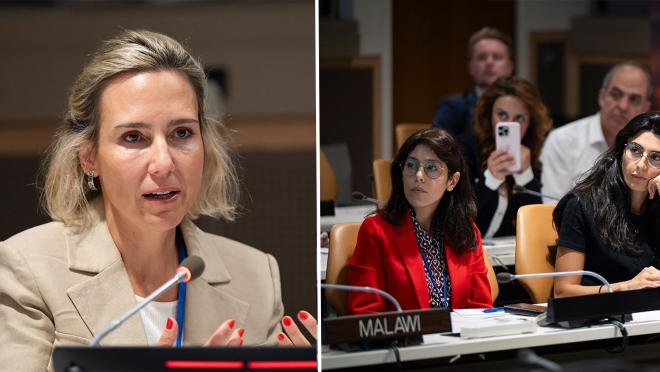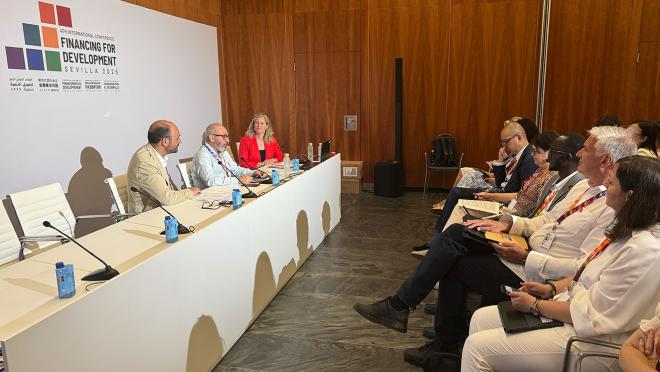A blog post by Jeremy Nicholls, Assurance Framework Lead for the SDG Impact Standards at Private Finance for the SDGs in UNDP’s Sustainable Finance Hub (SFH) June 2021 to December 2024. Originally published February 7, 2025.
In the race to achieve the United Nations Sustainable Development Goals (SDGs), the sustainable finance and development community has long focused on measuring impact. But with only 15 percent of SDG targets on track and over a third having regressed below 2015 levels, it's clear that measurement alone isn't enough. Consider this: global wealth now exceeds USD $463.6 trillion. Redirecting just one percent could mobilize $4.2 trillion annually for sustainable development, creating new markets and profit opportunities while funding innovations and solutions to accelerate progress on these critical global goals. The crucial piece too often missing? How private sector actors and financial institutions make decisions that affect people's lives and our planet.
The development sector has historically approached impact through a measurement-first lens, and the interest in impact management is more recent. At UNDP’s Sustainable Finance Hub (SFH), we developed the SDG Impact Standards to reimagine how businesses can create lasting value—by deeply understanding and responding to the needs of those affected by their business activities, with the urgency and scale that both stakeholders and our planet require, from investment decisions to operations, throughout their value chains and partnerships.
However, as businesses and investors began implementing these standards, UNDP discovered a disconnect. While robust frameworks for measurement existed, private sector decision-makers—those determining real impact through their investments and operations—remained largely absent from the conversation. They weren't being held accountable by the people experiencing the consequences of their decisions. Despite growing interest in the SDGs from the investment community, progress toward these goals remains critically behind schedule.
This reality prompted UNDP’s Private Finance for the SDGs team, part of SFH, to flip its thinking. Instead of starting with measurement, what if private sector institutions began with a simple assumption about what people would expect if they could hold them accountable? The working hypothesis is straightforward: stakeholders want as much positive and as little negative change to their wellbeing as soon as possible. With progress on critical SDG targets stalling or even reversing, the urgency of this shift cannot be overstated.
Through UNDP's work with businesses and financial institutions worldwide, it's become clear that this shift requires setting ambitious targets for increasing positive impacts and minimizing negative ones. The potential of this approach is already visible through initiatives like the SDG Investor Platform, which has identified over 600 Investment Opportunity Areas across 45+ countries. In Ghana and Nigeria alone, this has uncovered $200 million in potential investments, with $15 million already secured for SDG-focused projects.
This new approach fundamentally changes how private sector institutions think about impact measurement and management. First, innovation becomes central. Meeting ambitious targets requires generating new ideas about business models, investment strategies, products, and operations. Through UNDP's facilitation of over 40 policy dialogues globally, reforms are driving sustainable private sector investments across sectors like energy and infrastructure.
Second, data serves a different purpose. Rather than just measuring what happened, data should drive insights that lead to better investment and business decisions. This is why UNDP has developed comprehensive tools like the SDG Impact Standards and ISO/UNDP Guidelines for the SDGs, which are helping businesses and investors integrate sustainability into their core operations. A network of more than 60 Accredited Trainers globally ensures the SDG Impact Standards are accessible and implementable across the private sector. Further, UNDP and ISO are working to development the world’s first management standards for the SDGs, with an aim to be launched later in 2025.
Finally, risk takes on new meaning—it's not just about negative impact, but also about the opportunity cost of positive impact delayed or unrealized. This is why UNDP, in collaboration with the United Kingdom Accreditation Service (UKAS), is piloting an assurance scheme to validate private sector alignment with the SDG Impact Standards, strengthening global accountability frameworks.
At its core, this transformation is about making better private sector decisions. Every investment and business choice involves weighing different types of value and impact. By incorporating social and environmental outcomes into financial decision-making, businesses can choose between more and better-informed options that deliver both returns and positive impact. UNDP's work with partners like Fullerton Fund Management demonstrates this evolution, as they apply the SDG Impact Standards to align their Asia-focused decarbonization fund with sustainability principles while maintaining strong financial performance.
The path forward requires ambitious targets that reflect both stakeholder expectations and planetary boundaries. This means collecting data that drives insights, being transparent about trade-offs between positive and negative impacts, and making demonstrable progress year over year. Through UNDP's joint leadership of the Integrated National Financing Frameworks (INFF) initiative, support for over 50 countries has led to 140+ policy reforms, mobilizing $16 billion in new SDG-aligned private finance.
This approach creates value by bringing new voices and perspectives into business and investment decisions. By better understanding and responding to stakeholder needs, private sector leaders can build more resilient business models while addressing our most pressing challenges: climate change, nature loss, and inequality.
The sustainable development community must stop letting impact measurement wag the sustainable development dog. The focus needs to shift to making better investment and business decisions that deliver real change for people and planet—faster. Through its tools, frameworks, and partnerships, UNDP is leading this transformation of private finance from measurement to action.


















